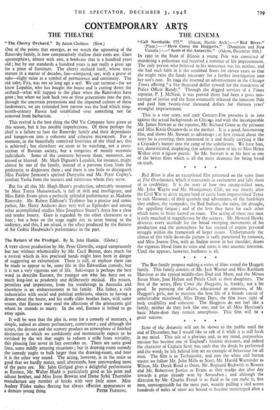The Return of the Prodigal. By St. John Hankin. (Globe.)
A VERY clever production by Mr. Peter Glenville, staged sumptuously but not without whimsicality by Mr. Cecil Beaton, does much for a revival which in less practised hands might have been in danger of suggesting an exhumation. There is still, or anyhow there can be made to appear to be, some life in this Edwardian comedy, but it is not a very vigorous sort of life. Saki-esque is perhaps the best word to describe Eustace, the younger son who has been not so much long-lost as prudently and deliberately mislaid. His return, penniless and impenitent, from his wanderings in Australia and elsewhere is an embarrassment to his family. His father, a rich industrialist with social and political ambitions, objects to having a drone about the house, and his stuffy elder brother fears, with some reason, that Eustace may steal the affections of the aristocratic girl whom he intends to marry. In the end, Eustace is bribed to go away again.
It will be seen that the plot is, even for a comedy of manners, a simple, indeed an almost perfunctory, contrivance ; and although the actors, the dresses and the scenery produce an atmosphere of finished distinction in which we confidently and momentarily expect to be ravished by the wit that ought to redeem a trifle from triviality, this pleasing fate never in fact overtakes us. There are some good lines, some mildly amusing situations ; but in drawing-room comedy the comedy ought to bulk larger than the drawing-room, and here it is the other way round. The acting, however, is in the main so good that we hardly notice, until afterwards, how unrewarding most of the parts are. Mr. John Gielgud _gives a delightful performance as Eustace, Mr. Walter Hudd is particularly good as his prim and odious brother, and Miss Irene Browne and Dame Sybil 'Thorndike manufacture any number of bricks with very little straw. Miss Audrey Fildes makes fleeting but alivays effective appearances as


































 Previous page
Previous page